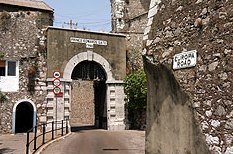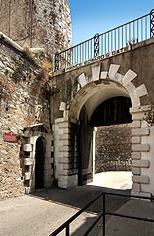Prince Edward's Gate
| Prince Edward's Gate | |
|---|---|
| Part of Fortifications of Gibraltar | |
| Charles V Wall, Gibraltar | |
 View of Prince Edward's Gate in Charles V Wall from Europa Road, looking north. | |
 View of Prince Edward's Gate in Charles V Wall looking south from Prince Edward's Road. Sentry box to the left. | |
| Coordinates | 36°08′06″N 5°21′07″W / 36.134984°N 5.351841°W / 36.134984; -5.351841 |
| Type | City gate |
| Site information | |
| Owner | Government of Gibraltar |
| Open to the public | Yes |
| Condition | Good |
| Site history | |
| Built | 1790 |
Prince Edward's Gate is a city gate at the entrance to Prince Edward's Road in the British Overseas Territory of Gibraltar. It cuts through Charles V Wall, one of the 16th century fortifications of Gibraltar at the former southern limit of the city. The gate is adjacent to the west wall of the Flat Bastion, another 16th-century fortification. The gate was named after Prince Edward, the future Duke of Kent, and was opened in 1790, the same year the prince arrived at Gibraltar as commander of the 7th Regiment of Foot (Royal Fusiliers). While the gate now has a limited role in the defence of Gibraltar, it continues to provide vehicular and pedestrian access through Charles V Wall. Prince Edward's Gate is listed with the Gibraltar Heritage Trust.
History

Prince Edward's Gate (pictured at right and below) is located on Prince Edward's Road in Gibraltar, the British Overseas Territory at the southern end of the Iberian Peninsula.[1][2][3] The gate is in the Charles V Wall, one of the sixteenth-century fortifications of Gibraltar that formed the early southern defences of the city.[4][5][6] Prince Edward's Gate, which was constructed in 1790, extends from the northwest corner of the Flat Bastion, another sixteenth-century fortification which projects southward from the Charles V Wall.[7][8][9] The gate was positioned adjacent to the retired flank of the bastion, behind the orillon of its west wall (pictured in OS map at right), to aid in its defence.[10][11][12] Prince Edward's Gate overlooked Trafalgar Cemetery to the southwest and the former St. Jago's Cemetery to the northwest.[5][7][13]
There are two guardhouses next to the Prince Edward's Gate.[3] A plaque (link below) adjacent to the sentry box on the north side of Prince Edward's Gate indicates that it was formerly the site of an inscription: "God and the soldier all men adore in time of trouble and no more, for when war is over and all things righted God is neglected and the old soldier slighted."[14]
Prince Edward

The gate was named after Prince Edward (2 November 1767 – 23 January 1820), the fourth son of King George III, and later the Duke of Kent (1799) and the father of Queen Victoria (1819).[8][15][16] At the time that the gate was opened, in 1790, the prince (pictured at right) was serving with the military in Gibraltar, as commander of the 7th Regiment of Foot (Royal Fusiliers).[8][16] There, he developed a reputation as a strict disciplinarian; the prince and his regiment left Gibraltar for Québec the following year, in 1791.[16] However, the Duke of Kent returned as Governor of Gibraltar in May 1802, following the death of Governor General Charles O'Hara who had died the previous February.[15][16] General Barnett had served as acting governor in the interim. Prince Edward had orders from his brother Prince Frederick, the Duke of York, to restore a sense of military discipline at the garrison. The soldiers had become slovenly, and spent much of their time inebriated.[15] Following his closure of taverns, a mutiny broke out on Christmas Eve 1802. The mutiny and his intended murder had been planned at the Three Guns Tavern, one of only three that the new governor had not closed. The mutiny was unsuccessful but, combined with his general reputation as a harsh disciplinarian, culminated in the duke's forced departure from Gibraltar in 1803.[15][16][17] However, he refused to give up his position as governor, which he retained in name only. Subsequently, lieutenant governors served in Gibraltar until the duke's death in 1820.[6][7][15]
Legacy
Prince Edward's Gate was the subject of stamps issued by the Gibraltar Philatelic Bureau in 1971 and 1993. The issue in 1971 (link below) consisted of a pair of stamps, with two versions of the same view of the gate, one from an early nineteenth century print and the other from a twentieth-century photograph. The issue in 1993 (link below) featured an image of the north side of the gate.[18][19][20] Prince Edward's Gate continues to provide access through the Charles V Wall. The gate and its two adjacent guardhouses have been listed with the Gibraltar Heritage Trust.[3]
References
- ^ "List of Crown Dependencies & Overseas Territories". fco.gov.uk. Foreign and Commonwealth Office. Retrieved 28 September 2012.
- ^ Roach, John (13 September 2006). "Neandertals' Last Stand Was in Gibraltar, Study Suggests". National Geographic News. National Geographic Society. Archived from the original on 14 November 2006. Retrieved 28 September 2012.
- ^ a b c "Gibraltar Heritage Trust Act 1989" (PDF). gibraltarlaw.gov.gi. Government of Gibraltar. Archived from the original (PDF) on 27 August 2012. Retrieved 29 September 2012.
- ^ "Historical Gibraltar Attractions - Charles V Wall". gibraltarinformation.com. Archived from the original on 29 August 2012. Retrieved 29 September 2012.
- ^ a b "Gates & Fortifications". aboutourrock.com. About Our Rock. Archived from the original on 1 November 2012. Retrieved 28 September 2012.
- ^ a b "Gates, Walls & Fortifications". Gibraltar Discover Pocket Guide. Discover Pocket Guide(s) Gibraltar Ltd: 30. July 2009. Retrieved 29 September 2012.
- ^ a b c "Historical Gibraltar Attractions (continued)". gibraltarinformation.com. Archived from the original on 26 February 2012. Retrieved 28 September 2012.
- ^ a b c "Flat Bastion, Flat Bastion Magazine". discovergibraltar.com. DiscoverGibraltar.com (Click Fortifications, City Walls and Fortifications, Section 3, L Flat Bastion). Archived from the original on 5 September 2013. Retrieved 28 September 2012.
- ^ Bethune, John Drinkwater (1786). A history of the late siege of Gibraltar, by John Drinkwater (2 ed.). pp. 27–28. Retrieved 29 September 2012.
- ^ Clive Finlayson, Darren Fa (31 October 2006). The Fortifications of Gibraltar 1068-1945 (illustrated ed.). Osprey Publishing. p. 19. ISBN 9781846030161. Retrieved 28 September 2012.
- ^ Clive Finlayson, Darren Fa (31 October 2006). The Fortifications of Gibraltar 1068-1945 (illustrated ed.). Osprey Publishing. p. 56. ISBN 9781846030161. Retrieved 28 September 2012.
- ^ James, Thomas (1771). The history of the Herculean Straits: now called the Straits of Gibraltar: including those ports of Spain and Barbary that lie contiguous thereto. Illustrated with several copper plates, Volume 2. Printed by C. Rivington for the author. p. 307. Retrieved 29 September 2012.
- ^ "Trafalgar Cemetery". Gibraltar Heritage Trust. Archived from the original on 6 February 2007. Retrieved 29 September 2012.
{{cite web}}: CS1 maint: unfit URL (link) - ^ "Prince Edwards Gates Plaque". Brit on the Rock. Retrieved 28 September 2012.
- ^ a b c d e Musteen, Jason R. (15 October 2011). "Chapter 5 - A Royal Mess". Nelson's Refuge: Gibraltar in the Age of Napoleon. Naval Institute Press. ISBN 9781612510842. Retrieved 29 September 2012.
- ^ a b c d e MacNutt, W.S. (1983). "Edward Augustus, Duke of Kent and Strathearn". In Halpenny, Francess G (ed.). Dictionary of Canadian Biography. Vol. V (1801–1820) (online ed.). University of Toronto Press. Retrieved 29 September 2012.
- ^ Rigg, James McMullen (1892). . In Lee, Sidney (ed.). Dictionary of National Biography. Vol. 31. London: Smith, Elder & Co. pp. 19–20.
- ^ "Stamp Detail - 1971". poppe-stamps.com. Poppe - Stamps. Retrieved 29 September 2012.
- ^ "Stamp Detail - 1993". poppe-stamps.com. Poppe-Stamps. Retrieved 29 September 2012.
- ^ "Gibraltar 1993 - SG706, £1 Prince Edward's Gate, VFU". Woolieback Collectables. Archived from the original on 4 March 2016. Retrieved 28 September 2012.
External links
- Google map of Prince Edward's Gate
- Photograph of plaque adjacent to Prince Edward's Gate sentry box
- Photograph of 1971 stamps
- Photograph of 1993 stamp
